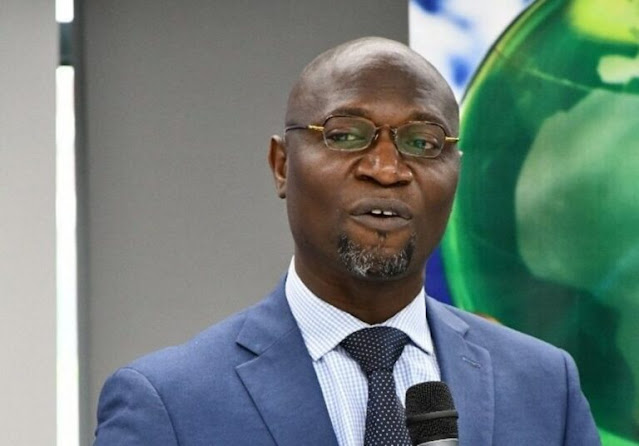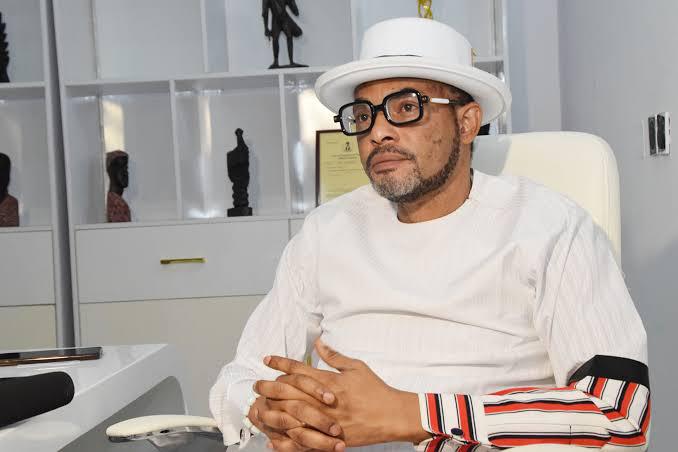ABUJA, Nigeria – August 25, 2025 – The Director General of the Securities and Exchange Commission (SEC), Dr. Emomotimi Agama, has reaffirmed the critical role of accountability and transparency in strengthening investor confidence in Nigeria’s capital market. Speaking at a stakeholder engagement event in Abuja, themed “Strengthening Accounting and Transparency through ICRC,” Dr. Agama highlighted the importance of robust internal control mechanisms for financial reporting in preserving market integrity and fostering trust.
Director-General, SEC, Dr. Emomotimi Agama
The event, organized by Smith Ighodalo Adewale Odiachi (SIAO) in collaboration with the Financial Reporting Council (FRC) under the Internal Control over Financial Reporting (ICFR) framework, underscored the need for sound governance practices in Nigeria’s public and private sectors. Dr. Agama also praised the recently enacted Investment and Securities Act (ISA) 2025, signed by President Bola Ahmed Tinubu, as a transformative step toward enhancing market efficiency and investor sentiment. This report provides a comprehensive analysis of Dr. Agama’s remarks, the significance of the ICFR framework, the impact of ISA 2025, and the broader implications for Nigeria’s capital market and economy.
The Importance of Accountability and Transparency
Dr. Emomotimi Agama, Director General of the Securities and Exchange Commission (SEC), delivered a compelling message on the pivotal role of accountability and transparency in Nigeria’s capital market during his goodwill address at the stakeholder engagement event in Abuja. The event, held on August 24, 2025, and themed “Strengthening Accounting and Transparency through ICRC,” was organized by Smith Ighodalo Adewale Odiachi (SIAO), a leading financial consultancy, in partnership with the Financial Reporting Council (FRC). The focus was on the Internal Control over Financial Reporting (ICFR) framework, a set of standards designed to ensure accurate and transparent financial reporting in public and private organizations.
Dr. Agama emphasized that sound internal control mechanisms are indispensable for maintaining market integrity and building investor trust. “Internal control over our financial reporting is a critical part of disclosures,” he said. “Whether in the securities market, for public companies, or other organizations, these controls reinforce accountability, transparency, and integrity within the financial system.” He explained that robust controls ensure that financial statements accurately reflect an organization’s performance, reducing the risk of fraud, misrepresentation, and mismanagement.
Investor confidence, according to Dr. Agama, is closely tied to the level of transparency and accountability demonstrated by financial institutions and market participants. “For investors, what matters is knowing that there is accountability, that people are doing what they ought to do, and stewardship is being upheld,” he stated. “When investors see that management is committed to these principles, they are more likely to invest.” This sentiment is particularly relevant in Nigeria, where historical challenges such as corporate governance lapses and financial scandals have undermined investor trust in the capital market.
The SEC boss highlighted the role of the ICFR framework in addressing these challenges. By establishing clear guidelines for financial reporting, internal audits, and risk management, the ICFR ensures that organizations adhere to best practices, providing investors with reliable information to make informed decisions. This, in turn, enhances the attractiveness of Nigeria’s capital market, encouraging both domestic and foreign investment.
The Investment and Securities Act (ISA) 2025
A significant highlight of Dr. Agama’s address was his reference to the Investment and Securities Act (ISA) 2025, signed into law by President Bola Ahmed Tinubu on March 25, 2025. Described as a landmark piece of legislation, the ISA 2025 introduces sweeping reforms aimed at modernizing Nigeria’s capital market, enhancing transparency, and boosting investor confidence. “The ISA 2025 has introduced key reforms aimed at fostering a more transparent and efficient market,” Dr. Agama said. “We are already seeing improved investor sentiment and increased confidence in the system.”
The ISA 2025 builds on the foundation of its predecessor, the Investment and Securities Act of 2007, by addressing emerging challenges in the capital market, such as digital assets, fintech innovations, and environmental, social, and governance (ESG) considerations. Key provisions include:
Enhanced Regulatory Oversight: The ISA strengthens the SEC’s authority to regulate market participants, including issuers, brokers, and investment advisers, ensuring compliance with transparency and accountability standards.
Support for Digital Assets: The legislation provides a framework for regulating cryptocurrencies, blockchain-based securities, and other digital assets, positioning Nigeria as a leader in Africa’s fintech space.
Investor Protection Mechanisms: The ISA introduces measures to protect retail investors, including stricter disclosure requirements, anti-fraud provisions, and mechanisms for resolving disputes.
Promotion of ESG Investments: The act encourages sustainable investments by mandating disclosures on environmental and social impacts, aligning with global trends toward responsible investing.
Dr. Agama noted that the ISA 2025 has already begun to yield positive results, with increased investor activity on the Nigerian Exchange Limited (NGX) and growing interest from foreign portfolio investors. The legislation is part of broader economic reforms under President Tinubu’s administration, which aim to address Nigeria’s macroeconomic challenges, including a headline inflation rate of 21.88% in July 2025, a 41.4% naira depreciation in 2024, and a 29.72% year-on-year increase in diesel prices to N1,789.45 per litre, according to the National Bureau of Statistics (NBS).
The ICFR Framework and Its Role in Financial Governance
The stakeholder engagement event, organized by SIAO in collaboration with the FRC, focused on the Internal Control over Financial Reporting (ICFR) framework, a globally recognized standard for ensuring the accuracy and reliability of financial statements. The ICFR, adopted in Nigeria through the Financial Reporting Council’s guidelines, requires organizations to implement internal controls to prevent errors, fraud, and misstatements in financial reporting. These controls include policies, procedures, and audits to ensure compliance with accounting standards and regulatory requirements.
The event’s theme, “Strengthening Accounting and Transparency through ICRC,” reflects the growing emphasis on internal controls as a tool for enhancing governance in Nigeria’s public and private sectors. The Internal Control and Risk Committee (ICRC), a key component of the ICFR framework, is responsible for overseeing risk management, ensuring compliance, and promoting transparency within organizations.
Dr. Agama underscored the synergy between the ICFR framework and the SEC’s mission to protect investors and maintain market integrity. “Whether in the securities market, for public companies, or other organizations, these controls reinforce accountability, transparency, and integrity within the financial system,” he said. By ensuring that financial reports are accurate and reliable, the ICFR framework builds trust among investors, regulators, and other stakeholders, fostering a stable and attractive investment environment.
The collaboration between SIAO and the FRC highlights the private sector’s role in promoting financial governance. SIAO, a leading consultancy with expertise in accounting and risk management, has been instrumental in supporting organizations to implement ICFR standards. The FRC, established under the Financial Reporting Council of Nigeria Act of 2011, oversees financial reporting and corporate governance, ensuring alignment with international best practices.
Nigeria’s Capital Market: Opportunities and Challenges
Nigeria’s capital market, managed by the Nigerian Exchange Limited (NGX) and regulated by the SEC, is a critical driver of economic growth, facilitating capital raising for businesses and investment opportunities for individuals. The market has shown resilience despite economic challenges, with the NGX All-Share Index closing at 141,004.14 points in August 2025, according to recent reports. However, the market faces significant hurdles, including low retail investor participation, limited liquidity, and macroeconomic pressures.
Dr. Agama’s emphasis on accountability and transparency addresses these challenges head-on. Historical issues, such as corporate governance failures and insider trading scandals, have eroded investor confidence, particularly among retail investors. The 2008 global financial crisis and subsequent domestic banking scandals further highlighted the need for robust governance mechanisms. The ICFR framework and the ISA 2025 are designed to address these issues by strengthening oversight, enhancing disclosures, and protecting investors.
The broader economic context adds complexity to these efforts. The NBS reported a 21.88% headline inflation rate in July 2025, driven by a 22.74% food inflation rate, which has strained household budgets and reduced disposable income for investment. The naira’s 41.4% depreciation in 2024 has increased the cost of imported goods and services, impacting corporate profitability and investor returns. The World Bank’s estimate that 38.9% of Nigerians live below the poverty line underscores the socioeconomic barriers to retail investor participation.
Despite these challenges, opportunities abound. Nigeria’s young and growing population, with over 220 million people, presents a vast market for investment products. The rise of fintech platforms, such as Bamboo and Trove, has made the capital market more accessible to young Nigerians, driving interest in equities and mutual funds. The ISA 2025’s provisions for digital assets and ESG investments position Nigeria to attract foreign capital, particularly as global investors seek emerging markets with strong growth potential.
Stakeholder Engagement and Reactions
The stakeholder engagement event in Abuja brought together regulators, financial experts, corporate leaders, and civil society organizations to discuss the importance of internal controls and transparency. Dr. Agama’s remarks resonated with attendees, who praised the SEC’s commitment to market integrity. Financial analyst Dr. Chinedu Okeke described the event as a “critical step toward rebuilding trust in Nigeria’s capital market.” He noted, “Dr. Agama’s focus on accountability and transparency aligns with global best practices and will attract more investors to the NGX.”
Representatives from SIAO emphasized the role of the private sector in supporting governance reforms. “The ICFR framework is a game-changer for financial reporting,” said a SIAO spokesperson. “Our collaboration with the FRC and SEC ensures that organizations adopt best practices, benefiting investors and the broader economy.” The FRC also reaffirmed its commitment to enforcing compliance, with Executive Secretary Rabiu Olowo stating, “Transparency in financial reporting is non-negotiable for Nigeria’s development.”
Investors and market participants expressed optimism about the ISA 2025’s impact. “The new law provides clarity and protection, making the capital market more attractive,” said Tunde Adeyemi, a retail investor in Lagos. However, some stakeholders called for greater efforts to educate retail investors. “Many Nigerians don’t understand the capital market,” said Amina Suleiman, a financial literacy advocate. “The SEC should invest in awareness campaigns to boost participation.”
Implications for Nigeria’s Capital Market and Economy
Dr. Agama’s remarks and the broader context of the stakeholder engagement event have significant implications for Nigeria’s capital market and economy. By prioritizing accountability and transparency, the SEC is addressing longstanding barriers to investor confidence, which could lead to increased capital inflows, higher market liquidity, and greater economic stability. The ICFR framework strengthens corporate governance, reducing the risk of financial scandals and enhancing the credibility of listed companies.
The ISA 2025’s reforms position Nigeria’s capital market as a competitive destination for global investors. By regulating digital assets and promoting ESG investments, the legislation aligns with global trends, attracting capital from environmentally conscious investors and fintech enthusiasts. The increased investor sentiment noted by Dr. Agama could drive growth in sectors like technology, agriculture, and renewable energy, supporting Nigeria’s economic diversification goals.
For the broader economy, a robust capital market can mobilize savings, finance infrastructure, and create jobs. The NGX’s role in facilitating Initial Public Offerings (IPOs) and bond issuances is critical for funding government and private sector projects. However, sustained economic reforms, such as curbing inflation and stabilizing the naira, are essential to maximize these benefits.
Challenges and Opportunities
The SEC’s efforts to enhance accountability and transparency face several challenges:
Economic Pressures: High inflation (21.88%) and naira depreciation (41.4%) reduce investor purchasing power and increase market volatility, necessitating macroeconomic stability.
Low Retail Participation: Limited financial literacy and poverty (38.9% of Nigerians below the poverty line) restrict retail investor engagement, requiring targeted education campaigns.
Regulatory Enforcement: Ensuring compliance with ICFR and ISA 2025 across diverse market participants demands robust enforcement mechanisms.
Global Competition: Nigeria must compete with other emerging markets for foreign investment, requiring continuous improvements in market infrastructure.
Despite these challenges, opportunities abound. The ISA 2025’s focus on digital assets taps into Nigeria’s vibrant fintech ecosystem, which has attracted over $1 billion in investments since 2020. The emphasis on ESG investments aligns with global demand for sustainable finance, potentially unlocking funding for renewable energy and green infrastructure. By leveraging technology and partnerships, the SEC can expand access to the capital market, particularly for young Nigerians.
Policy Recommendations
To maximize the impact of its efforts, the SEC should consider the following recommendations:
Enhance Financial Literacy: Launch nationwide campaigns to educate retail investors about the capital market, leveraging digital platforms and community outreach.
Strengthen Enforcement: Establish robust mechanisms to enforce ICFR and ISA 2025 compliance, with penalties for non-compliant entities.
Promote ESG Investments: Provide incentives for companies adopting ESG standards, attracting foreign capital and supporting sustainable development.
Support Fintech Integration: Accelerate the regulation of digital assets to foster innovation and protect investors in Nigeria’s fintech ecosystem.
Address Macroeconomic Challenges: Collaborate with the CBN and government to curb inflation and stabilize the naira, creating a conducive environment for investment.
Conclusion
The SEC’s commitment to accountability and transparency, as articulated by Dr. Emomotimi Agama, marks a pivotal moment for Nigeria’s capital market. The ICFR framework and the ISA 2025 provide a strong foundation for enhancing market integrity, boosting investor confidence, and driving economic growth. In a challenging economic environment marked by 21.88% inflation, naira depreciation, and widespread poverty, these reforms are critical for mobilizing capital and supporting Nigeria’s development goals. By addressing implementation challenges, promoting financial literacy, and leveraging partnerships, the SEC can position Nigeria’s capital market as a global leader, delivering lasting benefits for investors and the economy.






